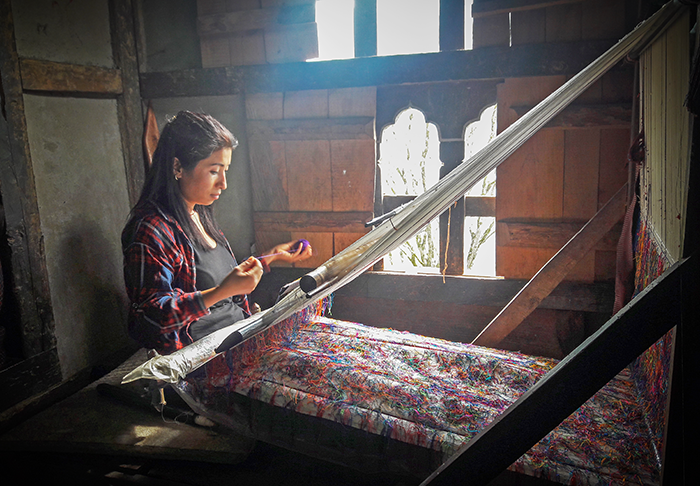Kelzang Wangchuk | Samdrupjongkhar
Sonam Yangzom started weaving when she turned 14. Today, her family of two daughters and ageing parents survive on this trade.
The 33-year-old from Khar in Pemagatshel wakes up before 6am, prepares the girls for school and goes to drop them at school.
Once she returns home, she sets herself down at the loom.
The single mother dropped school after completing class X. She first tried to weave simple patterns and then upgraded to weaving clothes with more intricate patterns.
She went to Thimphu at the age of 17 and started weaving on wage.
Sonam Yangzom said that it was challenging for her to survive in Thimphu as she used to get only Nu 2,000 to Nu 3,000 a gho or kira she wove. “I then learned weaving kishuthara on my own because there was no one to teach me,” she said.
She said she started weaving kishuthara in 2009 and used to earn Nu 13,000 to Nu 15,000 a kira and used to sell at Nu 45,000 to Nu 50,000 per kira. It was never an easy task to weave in Thimphu then as they were paid less.
Her wonderful married life was cut short when her husband became addicted to alcohol. “Life became difficult as every day was a struggle owing to his violent behaviour once drunk,” she said.
She said she finally divorced a few years ago. “Although with no job and two children to raise, making ends meet by weaving was not an easy task but I still continued to weave.”
“It was a difficult decision but I knew if I continued to live with him, my daughters would never have a good future. I was also tired of the violence so I took the risk to come out of it and raise them myself.”
She has no desire to marry again because she wants to prove that a woman can be independent and can raise children without a man.
Today, Sonam Yangzom is well known for her kishuthara kiras as she is the only one weaving it in Khar.
Sonam gets her orders from Thimphu. She earns about Nu 200,000 for the two kiras that she weaves in a year.
Sonam said it is not profitable like before because the yarn is expensive. She pays Nu 1,450 a kilogramme of bura thread and Nu 4,600 for silk.
She said she never thought that weaving would provide her with a steady income enough to survive and independently send her children to school.
“It is not easy. My eyes hurt and back aches but I have to do this because I’ve to look after my two daughters.”
Sonam Yangzom said it is all about making the best out of the opportunity and not being too dependent.
She said many women today still believe that their survival hinges on having a husband. “It is important to change this mindset.”
“I want to continue this for as long as my body can. I also want my two daughters to go to college. That is my dream,” she said.


